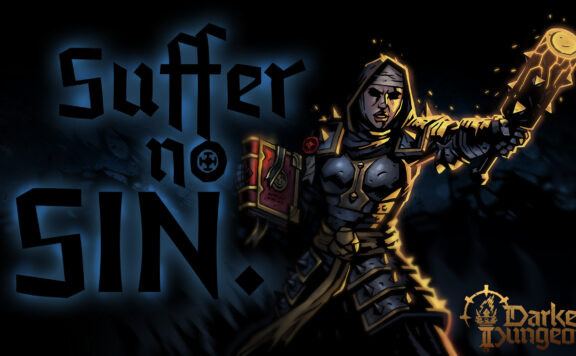Japan is a land steeped in legends. Folklore filled with supernatural entities are abundant in this deeply spiritual society. Yet, ancient tales of Oni, Yurei, and Yokai are not where this cultural phenomenon ends. Tokyo Dark is inspired by the modern stories of toilet monsters, underground mazes, and creepy girls that stalk the shadows still run rampant between the glittering skyline and neon billboards of the massive metropolis. This is our Tokyo Dark review.
Developed by indie studio Cherrymochi and published by the Square Enix Collective, Tokyo Dark follows Detective Ayami Ito as she struggles against unnatural forces and mysterious strangers while attempting to unravel the mystery surrounding a deeply personal tragedy. After various iterations, Tokyo Dark evolved into an interactive video game as Maho Williams explained when Gamespace spoke to CHerrymochi about Tokyo Dark:
Tokyo Dark was always planned to be interactive, but started life as a web-connected ARG type ‘paper novel’. Quite early on we realized that choices and consequences were going to be core to the story, soon after we switched to more of a ‘video-game’ experience and focused on combining western point and click style gameplay with Japanese visual novels.

Irrespective of the final form, this is still an evocative story of family and loss. The brainchild of Jon Williams, Tokyo Dark leads Detective Ito through the dingy back alleys of Shinjuku to the suicide forests of Aokighara, traversing Tokyo in pursuit of her missing partner, Tanaka. The backdrop of Tokyo is a perfect stage for this journey. Ancient shrines, Yakuza mobsters, hostess bars, and maid cafes all collide in a blend of tradition and modern sensibilities that quite adequately reflects much of Tokyo Dark.
The opening streets of Tokyo are painted with this same fusion of old and new. A mixture of hand drawn and watercolor art intermingles with manga character models and full motion video. Like the visual aesthetics, Matthew Steed’s soundscape is equally diverse, bouncing between the creeping drones of the undead and upbeat arcade bit tunes. It is an approach that could seem quite discordant some scenarios, but it seems to fit Detective Ito’s story as she zips between the various microcosms of Tokyo life.
Each of these examples of Tokyo life is a hive of activity, full of characters to interact with. As a point and click adventure, it is no surprise that much of this interaction is dialogue heavy. Thankfully character interactions are well written. Detective Ito is engaging as a central character and there is no reason why she shouldn’t be. Cherrymochi primarily developed the script in English and translated this back into Japanese. So, while some of the city’s sleazeball businessmen and cat maids might feel a little like caricatures, they are ultimately believable in this version of Tokyo.

Cherrymochi’s Tokyo is, however, not exactly an accurate representation of the city and it’s patrons as Maho Willaims explained to Gamespace.
Tokyo Dark touches on some real issues, but it is in no way suppose to be an authentic representation of Tokyo. It is an anime style pulp psychological horror story written to keep players on the edge of their seats. While there is underlying intention and deeper meanings written into the narrative for those who wish to look for it, our main focus was to make a gripping adventure story that plays with anime tropes to create something a little unexpected.
Ultimately it is nearer to a mildly exaggerated representation from an outsiders point of view. This approach makes Detective Ito is the perfect lens to view this image of Tokyo through. The only female detective on the local force, struggling to overcome her own emotional issues, and working on the edge of the system marks Ito an outsider even in her chosen profession. It’s a move that makes it easy to accept to empathize with the Detective and accept her gradual descent towards madness.
Ito’s mental state is easily tracked using the game’s SPIN system. The Sanity, Professionalism, Investigation, and Neurosis indicators are a series of personality stats that fluctuate based on the actions of a player. Choose to threaten a potential suspect and you may find your Professionalism stat will drop towards negative territory while an investigation may proceed swiftly with the injection of new information.

SPIN mechanics allow players some level of choice in managing Ito’s actions, resulting in any of eleven potential endings. Potential clues can be bypassed in haste, sacrificing Investigation points, while slowing down slowing down and spending time and spending time with Lady Fluffington, Ito’s cat, can have a positive impact on Sanity and Neurosis levels. Almost every decision invariably has an impact on Ito’s mental state, and while players can avoid unreasonable damage to Ito’s health by being sensible, some of the more tense moments in the game are unavoidable. As a result, careful management of the Sanity and Neurosis attributes is essential to avoid a complete mental breakdown.
The inclusion of this failure state into Tokyo Dark is coupled with an auto save feature that locks in decisions. There is no going going back, no backups, and no optimal route. Throw caution to the wind if you wish but you can only descend so far before the black bleeds in and Ito breaks under the torment. More than once, I had to make decision I would rather not in order to balance stats. This makes player decisions feel relevant and elevates Tokyo Dark beyond a linear visual novel.
For players that manage these pressures and uncover the truth behind Tanaka’s disappearance, there are a number of potential conclusions. After spending around five hours on an initial play through, I found that the narrative diversity in Tokyo Dark provides a great deal of replay value. No matter the outcome, Tokyo Dark was a journey that made player decisions feel relevant. It was sad, disturbing with a few dark, and even some uplifting, twists. Now, I’m heading back to the sewers beneath Shinjuku to find out what I missed and one of many new adventures with Detective Ito. Tokyo Dark is out now on PC.
Tokyo Dark Review Score – 8/10
Pros:
+ lots of replay value
+ player decisions feel relevant
+ Excellent characters and dialogue
Cons:
– It is dialogue heavy
– No way to track previous choices
– Puzzles can be a little simple sometimes







